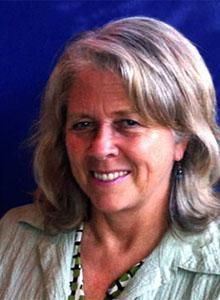Meet EPA Scientist Jane Gallagher, Ph.D.

Studying the Link between Asthma and Air Pollution
Dr. Jane Gallagher is an EPA research health scientist working with expertise in both field and clinical studies. She develops, tests, and integrates new methods, approaches and biomarkers to study human health risks posed by environmental chemicals.
Why does your science matter?
Asthma is one of the leading causes of emergency room visits, hospitalization and missed school day among children in the United States. I am part of a team of over 30 scientists who are involved in the Mechanistic Indicators of Childhood Asthma (MICA) study. We are collectively looking at the many factors that influence the development of asthma and worsening of symptoms associated with asthma.
- Asthma
- Mechanistic Indicators of Childhood Asthma (MICA) Study: piloting an integrative design for evaluating environmental health Exit
We designed indoor and outdoor air monitors that were assembled by the families participating in the study, and we used blood and urine samples to measure environmental exposure. More than 200 non-asthmatic and asthmatic children have provided samples, and researchers applied cutting-edge DNA and RNA technologies and computational and statistical approaches to evaluate the connections between the many environmental, biological, clinical and genetic factors that make children susceptible to asthma.
What do you like most about your research?
What I like most about the research here at EPA is the team oriented approach and the smart, dedicated, hard working and diversely talented collaborators. I also enjoy mentoring high school, graduate and postdoctoral students. It has been interesting to follow their varied careers paths in patent law, medicine, health administration-policy, oceanography, molecular biology, and risk assessment.
If you could have dinner with any scientist, past or present, who would you choose and what would you like to ask them?
I would love to have dinner with all my mentors, now in their 70’s, who provided me with such stellar career opportunities during the peak of their careers. I’d also like to invite the many young investigators for whom I provided opportunities. I would ask them how their experiences influenced their career paths and how the older scientist’s insights and perspectives on environmental public health challenges changed over their lifetime.
When did you first know you wanted to be a scientist?
Like many children who are given the opportunity to experience the wonders of nature, I think I have been a scientist all my life (just minus the formal training!). I ask endless questions and love problem solving and the range of scientific disciplines that help to inform public health policy. Working in an industrial setting helped me see how scientists could play an important role in helping to understand the complex linkages between environmental exposures and the potential health impact on sensitive and healthy persons alike.
Tell us about your background.
I graduated from SUNY (State University of New York) Potsdam with a bachelor’s degree in Chemistry. Early in my career, I supervised employees in one of the country’s first industrial recycled waste water treatment plants. As a supervisor in General Motor’s Foundry division, I gained a keen appreciation of the importance of engineering controls and their value in reducing health risks posed by environmental agents.
Because of these experiences and interests, I pursued degrees in Environmental Engineering (Purdue University), Public Health (University of Utah) and a PhD in Environmental Sciences and Engineering from the University of North Carolina, Chapel Hill.
If you were not a scientist, what would you be doing?
Time spent here at EPA as a scientist has been the perfect occupation for me, but I love being outdoors, so I have often wondered about what it would be like to be an orchard manager, plant geneticist, walking postal worker, wilderness therapist, or camp director.
Any advice for students considering a career in science?
I think it’s important to have a diverse background and set of skills to get hired for a job in environmental sciences. I advise students to appreciate their relatively short stint in the educational world by taking classes that provide a broader perspective than their major would otherwise require. It is extremely important to develop good communication skills, and carefully consider the choice of research advisors; look to those who give you confidence and encourage creativity.
